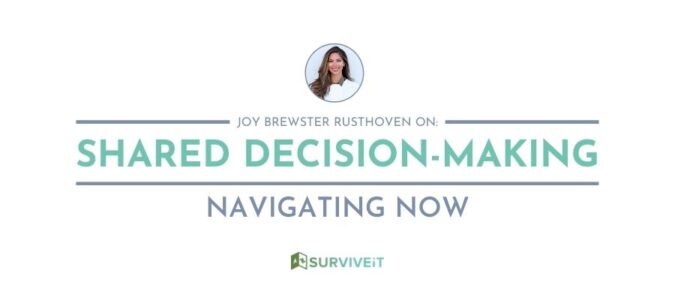Navigating Shared Decision-Making in the Cancer Setting | Navigating Now

“Shared decision-making” has become a sought-after focus in the oncology field. It’s a lovely sentiment, but there are a number of factors that are currently working against us to achieve this mutually beneficial component of cancer care. In part one of this topic, we’ll address two factors: patient understanding and recall issues as well as the time factor.
Patient Understanding and Recall
One key hurdle to cross in our attempt to adequately engage in shared decision-making is increasing patient understanding and recall. I consider this a key hurdle because the cancer experience could be described as a series of highly important decisions that must be made in a timely manner – by someone.
A recent study found “patients are able to recall, at best, 49% of information accurately one week later”. That number significantly decreases based on level of education.
Available Resources & Time
Time is another factor to consider. When you’ve just been told you have a potentially life-threatening disease, there is no such thing as “enough time” with your oncologist. However, we understand there are other patients to be seen and powers-that-be that determine how much time we are allotted. In the study mentioned above, “Provider behaviors [that may be] associated with patient recall, such as open-questioning and “teach back,” were rare.” Our theory is that limited time is one of the reasons for this.
The other time element is time to treatment initiation – which ranges from 0-60 days depending on the cancer type, according to this study. Many of us frantically try to ingest as much information about the disease as we possibly can. Access to Dr. Google and unlimited (credible or not) resources makes this even more complex.
A Trying Combination & A Tactical Solution
Coupling the patient recall issues with the time to treatment initiation and we’re left to weigh in on huge decisions that we know little about.
SURVIVEiT®’s proposed solution involves identifying and focusing on the most important items to discuss, understand, and contemplate in order to make informed decisions. As patients and caregivers, in order for us to engage in any conversations, we have to feel invited to do so and offered a bit of guidance in what that looks like.
Launching later this month is SURVIVEiT’s Cancer Navigation Tool: Lung Edition. In this first-of-its kind digital cancer navigation tool, shared decision-making is the underlying theme. We believe patients should not only be aware, but be involved in various decisions that ultimately impact their outcomes. We believe it’s so crucial that we dedicated one of the five key steps exclusively to this. It’s time to meet the patient where they are – which is often a state of feeling overwhelmed or out of control. With SURVIVEiT’s Tool, we are equipping patients to meaningfully engage in the decisions that impact their outcomes and quality of life.
